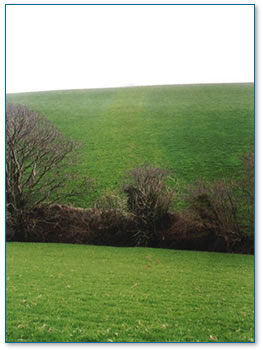fertilisers
 |
Manure Heap |
A fertiliser is something that
is put onto fields (or gardens) to improve the soil and make the
plants grow better. The fertiliser contains nutrients (or food)
for the plants.
Inorganic fertilisers are made
up of different chemicals such as nitrogen, phosphorous, calcium,
sulphur, and potassium, some of which are harmful to river wildlife.
Organic fertilisers are made of natural materials such as manure
and compost.
Farmers can help stop fertilisers
getting into watercourses and causing pollution by thinking about
when is the best time to put fertiliser onto their fields. Some
chemicals used in fertilisers, like nitrogen, can only be used by
plants in the autumn. The rest of the year the nitrogen is not needed
and will be washed off the fields by rain into rivers and streams!
• Nitrogen used in fertilisers
to increase crop growth. If nitrates are washed off the fields into
streams and rivers they enter the water cycle (B02).
An increase in the amount of nitrates in a stream will upset the
balance of nutrients (food) (G1)
for plants and animals. High nitrate levels may affect human health,
because more nitrates in a stream will eventually lead to more nitrates
in our drinking water.
On a farm or in a garden it is
important to store fertilisers with care so that the bags that hold
the fertiliser cannot be nibbled by mice and rats or get damaged
by the weather or fire. If any of these things happen the fertiliser
can end up in rivers and streams causing pollution and affecting
plant and animal life.
 |
Nitrogen rich
grass |
By carefully calculating what
fertiliser is needed on a farm, and making sure that the equipment
is working the best it can, a farmer might be able to reduce the
amount of fertiliser needed.
There might be organic waste
(W07g) from the farm like manure
(W07d), slurry and sewage sludge
(G1) that can be used
to help crops grow because of the nutrients in them. In this way
waste can be reused (W11)
and less chemical fertilisers will be needed.
Another way of cutting the amount
of chemical fertilisers used is to reduce the amount of nutrients
wasted or washed away. In the winter a farmer could grow a ‘green
winter crop’ so that the nutrients are held in the soil and
used by plants instead of escaping into the watercourses.
All types of fertilisers can
end up in the water cycle and can affect the life of plants and
animals living in and near rivers and streams. As every living thing
relies on water to live, eventually everything will be affected
by increased amounts of fertiliser going into the water cycle, not
least of all us humans.
|

